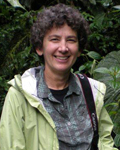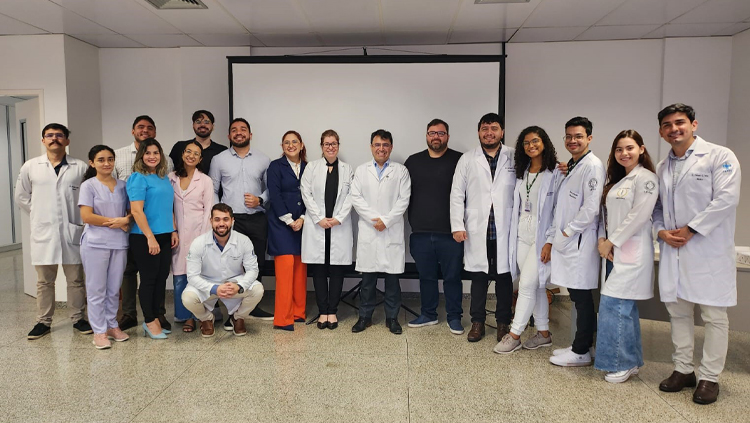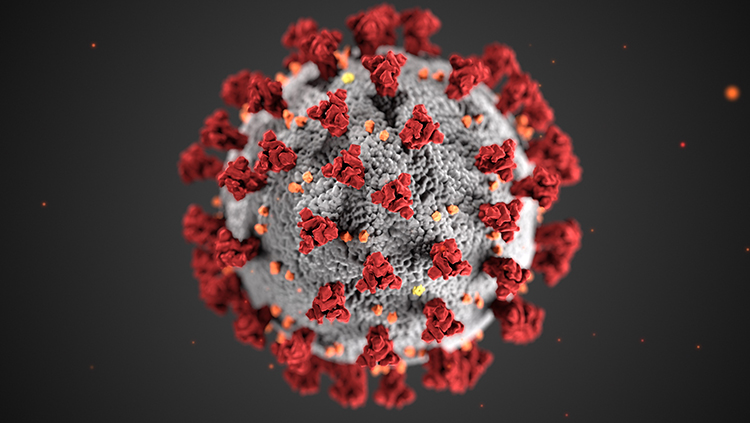This event took place on April 3, 2019 and is no longer available on-demand.
Neuroethology, or the study of how nervous systems generate natural behaviors, has been fundamental to the development of neuroscience as a scientific discipline. By focusing on species that are champions in a given behavior, neuroethological experiments maximize the ratio of signal to noise. The application of modern gene sequencing and gene editing tools has the potential to invigorate and revolutionize the field of neuroscience by allowing scientists to study the molecular and circuit underpinnings of species-relevant behaviors in non-traditional model organisms.
This virtual conference will provide insight and guidance for researchers eager to discover the neural substrates of perception and natural behaviors using diverse techniques, including comparative evolutionary genomics, circuit cracking, and computational approaches.
The four sessions will highlight the work of visionaries as well as relative newcomers to the field and is intended for scientists at all stages of their careers.
The conference will begin with a discussion between prominent neuroscientists whose work exemplifies the strengths of the neuroethological approach. The next sessions will examine how neuroethologically grounded findings influence the modern clinical domain of ‘individual neuroscience’, and other broad translational applications. The conference will close with early career neuroscientists, who will share their vision for where this field will go next and how neuroethology may change the future of neuroscience.
Click on each session title to reveal its description.
Session 1: What is Neuroethology?
Speakers: Daphne Soares, Gilles Laurent, Catharine Rankin
Time: 10 a.m. – 11 a.m. EDT
This session will illustrate the importance of neuroethological thinking and neuroethological methodologies in neuroscience. Gilles Laurent and Catharine Rankin will address the complexities of studying behavior and the importance of considering evolutionary processes in the design of neural systems. They will stress the need to understand the context in which behaviors occur and how small changes in a stimulus or paradigm can alter behavior.
Session 2: How Basic Neuroethological Findings "Translate"
Speakers: Stephanie White, Ron Hoy, Michael Long
Time: 11:15 a.m. – 12:15 p.m. EDT
Michael Long and Ron Hoy will discuss their research on basic neuroethological processes and how this work has translated to research in humans. Michael Long will present on the neural mechanisms underlying social communication, focusing on ‘turn-taking’ vocal interactions in songbirds, rodents, and humans. Ron Hoy will discuss his research into the role of hearing organs for mating rituals in mosquitos and jumping spiders, and how those discoveries have influenced the development of microphones.
Session 3: Feedback From a Forward-Thinking Neuroethologist
Speakers: Felix Schweizer, Eve Marder
Time: 12:45 – 1:45 EDT
Eve Marder studies the stomatogastric ganglion in crustaceans to learn how neuronal networks produce a behaviorally appropriate output. Her work in living animals and computer models demonstrates that, given a connectome, seemingly random combinations of neuronal and synaptic properties produce outputs that are surprisingly similar and viable. Under stress, however, each network “crashes” in different ways, suggesting that while all networks are “good enough,” distinct individuals are better at survival, depending on the stressor. Her neuroethological approach has led to fundamental neuroscientific insights with ramifications ranging from evolution to human health.
Session 4: Next Generation Approaches to Neuroethology
Speakers: Darcy Kelley, Eva Fischer, Mirjam Knörnschild, Morgan Wirthlin
Time: 2:00 – 3:15 EDT
In this session, moderated by Darcy Kelley, three early career neuroscientists will discuss the future of the field of neuroethology and the new and exciting approaches they use for their research. Morgan Wirthlin, Eva Fischer, and Mirjam Knörnschild will address their use of non-model species, and comparative epigenomics to study analogous and distinct behaviors across species. They will also highlight the importance of using evolutionarily informed approaches to genomic and epigenomic studies of behavioral traits.
On-Demand Data Blitz Sessions
These 5-10 minute sessions on various topics can be viewed at any point on-demand once the virtual conference environment opens.
- Christophe Dupré; “Non-overlapping Neural Networks in Hydra vulgaris”
- Eric Fortune; weakly electric fish
- Lan Deng; C. elegans
- Makoto Araki; zebrafinches
- Ulises Ricoy and Andres Romero; earthworms
- Nancy Day and Melissa Coleman; duetting wrens
- Hilary Katz and Eduardo Guadarrama; lamprey
- Sam Reiter; “Elucidating Cuttlefish Camouflage”
- Anna Schneider; crabs
Speakers
Stephanie A. White, PhD
Stephanie A. White is a professor of integrative biology and physiology at the University of California, Los Angeles, where she chairs the undergraduate neuroscience interdepartmental program. She codirects the Neural Systems and Behavior course at the Marine Biological Laboratory in Woods Hole, MA. She investigates song learning and the underlying neural circuitry in avian brains in order to understand how the brain gives rise to vocal learning including human speech. She earned her BA in biopsychology from Connecticut College and her PhD in neuroscience from Stanford University, and completed her postdoctoral training at Duke University.
Daphne Soares, PhD
Daphne Soares is an assistant professor of biology at the New Jersey Institute of Technology, where her lab studies the neural adaptation of organisms to extreme environments, particularly in cavefish. She Soares received her PhD in neuroscience from the University of Maryland, where she was also an assistant professor in the Department of Biology.
Gilles Laurent, PhD
Gilles Laurent is director of the department of neural systems and coding at the Max Planck Institute for Brain Research. He was previously faculty at the California Institute of Technology. His research focuses on neural systems — from insect olfactory networks to cephalopod camouflage control systems and reptilian cortex — as well as brain evolution and the dynamics of neural networks. He trained as a veterinarian and earned his PhD in neuroethology in Toulouse, France, and learned neuroscience as a postdoc in Cambridge, United Kingdom.
Catharine Rankin, PhD
Catharine Rankin is a professor of psychology and center investigator at the Djavad Mowafaghian Center for Brain Health at the University of British Columbia. Her research uses behavioral, neural, and genetic approaches in Caenorhabditis elegans to determine how experience changes the brain. Rankin earned her BA and master’s in psychology from the University of Guelphm in Canada, and her PhD in animal behavior from the City University of New York, where she studied African electric fish. She completed postdoctoral training at Yale University in the lab of Dr. Thomas Carew, studying the development of learning in Aplysia californica. Rankin's focus of using behavior as a readout of the state or function of the nervous system is a central aspect of neuroethology.

Ron R. Hoy, PhD
Ron R. Hoy is the David and Dorothy Merksamer Professor of Biological Sciences in the department of neurobiology and behavior at Cornell University, as well as a Howard Hughes Medical Institute professor. He has been on the Cornell faculty since 1974. His research areas are in the bioacoustics of animal communication, neuroethology, and comparative sensory systems. The work of the Hoy Lab has been widely published, including in Science, Nature, PNAS, and Current Biology. The lab is interested in the evolution of auditory behavior and auditory systems in insects and spiders, and convergences with its vertebrate and mammalian counterparts. Hoy’s research in animal sounds and communication have led to interests in zoomusicology and biomusic, which have led to collaborations with musicians. His teaching interests are reflected in his selection as a Howard Hughes Medical Institute professor. He is an elected member of the American Academy of Arts and Sciences and a member of the Society of Neuroscience and the International Society for Neuroethology.

Michael Long, PhD
Michael Long is an associate professor and vice chairman for research of the NYU School of Medicine Neuroscience Institute. He completed his graduate studies with Barry Connors at Brown University, where he investigated the role of electrical synapses in the mammalian brain. During his postdoctoral work with Michale Fee at MIT, Long began to study to the songbird model system to uncover the cellular and network properties that give rise to learned vocal sequences. Since beginning his laboratory in 2010, Long has focused his attention on the neural circuits underlying skilled movements, often in the service of vocal interactions. To accomplish this, the Long Lab has taken a comparative approach, examining relevant mechanisms in the songbird, a newly characterized neotropical rodent, and humans. In addition to federal funding, the Long Lab has received support from the New York Stem Cell Foundation, the Rita Allen Foundation, the Klingenstein Foundation, and the Herschel-Weill Foundation.
Felix E. Schweizer, PhD
Felix E. Schweizer is a professor in the department of neurobiology at the David Geffen School of Medicine at the University of California, Los Angeles. Born in Basel, Switzerland, he received his PhD in biochemistry from the University of Basel and conducted his graduate research in the laboratory of Max M. Burger under the direction of Theo Schafer. He was a postdoctoral fellow first in the department of molecular and cellular physiology at Stanford University in the laboratory of Richard W. Tsien and then in the department of neurobiology at Duke University in the laboratory of George J. Augustine. His research focuses on the cellular underpinnings of network function with a focus on synaptic transmission.
Eve Marder, PhD
Eve Marder, PhD, is the Victor and Gwendolyn Beinfield University Professor at Brandeis University and past president of the Society for Neuroscience (2008). Marder earned a BA from Brandeis University in 1969 and her PhD from UCSD in 1974. Marder conducted her postdoc at the University of Oregon and Ecole Normale Superieure in Paris, France and has been a faculty member at Brandies since 1978. She is a member of American Academy of Arts and Sciences, National Academy of Sciences, National Academy of Medicine, and American Philosophical Society, has won the Gruber Prize, Kavli Prize, NAS Neuroscience Prize, and Gerard Prize, and holds honorary doctorates from Bowdoin College, Princeton University, Tel Aviv University, and Universite de Liege. Marder was instrumental in demonstrating that neuronal circuits are not “hard-wired” but can be reconfigured by neuromodulatory neurons and substances, and in developing the dynamic clamp and models of intrinsic homeostasis.
Darcy B. Kelley, PhD
Darcy B. Kelley is the Harold Weintraub and Howard Hughes Medical Institute Professor in the department of biological sciences at Columbia University. She earned her PhD in neurobiology and behavior in 1975 from The Rockefeller University, where she focused on endocrine regulation of reproductive behavior in Xenopus and went on to study birdsong as a postdoctoral fellow. She has taught at Columbia University since 1981, when she moved from a faculty position in the neuroscience program at Princeton University to Columbia for an assistant professorship. The goal of her research is to determine how the nervous system produces and responds to social signals, and to identify — across evolutionary timescales — the genetic changes supporting the emergence of species differences in courtship communication.
Eva K. Fischer, PhD
Eva K. Fischer is a postdoctoral fellow in the O'Connell Lab at Stanford University. She is interested in the mechanisms by which behavioral diversity is generated, maintained, and modified by evolution. Her postdoctoral work uses poison frogs as a model system to ask whether shared neural, hormonal, and molecular mechanisms mediate parental care across species and sexes, and to explore neural and molecular mechanisms mediating juvenile aggression in poison frog tadpoles. She obtained her PhD from Colorado State University under the supervision of Kim L. Hoke. The goal of her dissertation was to explore the forces facilitating and constraining behavioral adaptation in Trinidadian guppies (Poecilia reticulata), and in particular to understand the interaction between genetic background and developmental plasticity in this context. She earned her BA from Cornell University, where she double majored in biology and French.
Mirjam Knörnschild, PhD
Mirjam Knörnschild is a Heisenberg fellow leading an independent research group at the Museum of Natural History and the Free University in Berlin, Germany. She is also a research associate at the Smithsonian Tropical Research Institute, in Panama. As a behavioral ecologist, she holds extensive scientific expertise in acoustic communication, cognition, and learning in mammals, particularly bats. Her research projects are highly interdisciplinary, incorporating acoustics, genetics, neuroethology, and biolinguistics. Before moving to Berlin, she worked as a postdoctoral researcher at Ulm University and as a PhD student at the University of Erlangen-Nuremberg, in Germany.

Morgan Wirthlin, PhD
Morgan Wirthlin is a postdoctoral fellow at Carnegie Mellon University. Through her research she seeks to understand the evolution of complex behaviors, using a synthesis of comparative genomics and experimental neurobiology. She received her BA in biological sciences, with a specialization in evolution and ecology, from the University of Chicago in 2009. She earned her PhD in behavioral neuroscience from Oregon Health and Science University in 2016. In her dissertation work, she sought to identify the fundamental genomic and molecular properties characterizing brain circuits for vocal learning, the basis for birdsong and human speech. She is now developing methodologies to interrogate the genomic regulatory elements that drive behavioral gene expression, through a combination of large-scale computational genomic analyses and high-throughput experimental assays of gene expression. She has performed field work in North and South America and maintains a long-term interest in developing new methods for exploring questions of neurobiology and genomics in field settings. She was awarded the inaugural BrainHub postdoctoral fellowship and joined the computational biology department in 2016.
Christophe Dupré, PhD
Christophe Dupré is a postdoctoral fellow in the molecular and cellular biology department at Harvard University, in the laboratories of Florian Engert and Jeff Lichtman. His research focuses on the nervous system of Hydra vulgaris, particularly on how it is able to adapt to different sizes. He received his BS and MSc from the Swiss Federal Institute of Technology and his PhD from Columbia University under the supervision of Rafael Yuste.
Eric Fortune, PhD
Eric Fortune is an associate professor in the New Jersey Institute of Technology Federated Department of Biological Sciences. He received his PhD in organismal biology and anatomy from the University of Chicago and continued his research as a postdoctoral fellow in the Department of Biology at the University of Utah. Fortune's first faculty position was at the Johns Hopkins University in the Department of Psychological and Brain Sciences. His research examines the mechanisms by which sensory feedback is used in the brains of animals for the control of behavior.
Lan Deng
Lan Deng is a PhD candidate in the neuroscience track of the biological sciences program at the New Jersey Institute of Technology. She is also a laboratory course instructor. Her research focuses on the study of the ventral nerve cord in C. elegans to understand how neurons coordinate to allow the animal to move.
Makoto Araki, PhD
Makoto Araki is a staff scientist at the Okinawa Institute of Science and Technology Graduate University (OIST). His research focuses on auditory neuronal circuit encoding of species-specific courtship songs in the zebra finch songbird. He earned his PhD in biological sciences from the Hokkaido University and completed postdoctoral training at OIST.
Ulises Ricoy, PhD
Ulises Ricoy is dean of the College of Arts and Sciences and associate professor of biology at Northern New Mexico College (NNMC), a rural Hispanic/Native American-Serving Institution. He has championed faculty and undergraduate team experiences initiatives via collaborations with the University of Pittsburgh, the University of Massachusetts, Cornell University, and the Argonne and Los Alamos national laboratories. His research focuses on low-cost approaches to examine behavior and neurophysiology in invertebrate organisms. He earned his BS and PhD in behavioral neuroscience from the University of Texas at San Antonio under the direction of Dr. Joe L. Martinez Jr. and completed postdoctoral training in synaptic biophysics at Oregon Health Sciences University. With Andres Romero he has been characterizing vibration frequency sensitivity and neural activity in escaping earthworms.
Andres Romero
Andres Romero is an undergraduate research student at Northern New Mexico College. His research is in neurophysiology, focusing on the electrophysiological characteristics behind escape behaviors. The model organisms he studies display distinct anti-predator behaviors that play a key role in their survival. He has also done research in genetics and molecular biology, specifically in subnuclear organelles and their role in spinal muscular atrophy. Romero earned his BS in biology and is working toward a BS in environmental science, with graduate studies in neuroscience as the next step in his career trajectory.
Nancy Day, PhD
Nancy Day is a postdoctoral researcher in the integrative biology and physiology department at the University of California, Los Angeles. She investigates FoxP2, a gene known to be critical for the proper development of human speech and language, in zebra finch songbirds. As a graduate student in neuroscience at the University of Minnesota, she used in vivo electrophysiological recordings to study circuit maturation in HVC of songbirds, leading to her involvement in the duetting wren collaboration. She earned her BA in biology and psychology at Whitman College, where she will be an assistant professor of psychology starting in fall 2019.
Melissa Coleman, PhD
Melissa Coleman is an associate professor of biology at the Keck Science Department of Claremont McKenna, Pitzer, and Scripps colleges. Her research interest is how the brain produces natural behaviors. She currently has two related research projects: one examining the neural mechanisms of duet singing, a cooperative behavior, in a neotropical wren, and the other examining the neural mechanism of formation of song preference in a monogamous find. She earned her BS in biology at Samford University and her PhD in neuroscience at the University of Alabama, and completed postdoctoral training at Brandeis and Duke universities.
Hillary Katz, PhD
Hilary Katz is a postdoctoral researcher in the lab of Jennifer Morgan at the Marine Biological Laboratory in Woods Hole. She earned her BA from Mount Holyoke College and her MS and PhD in integrative biology from the University of Chicago. Her current research focuses on spinal cord regeneration in the sea lamprey. She uses behavioral and molecular techniques to better understand how lampreys regenerate their spinal cord.
Eduardo Guadarrama
Eduardo Guadarrama is a research assistant in the lab of Jennifer R. Morgan at the Marine Biological Laboratory in Woods Hole. His research focuses on spinal cord regeneration in the sea lamprey. He received his BA in neuroscience from Amherst College.
Sam Reiter, PhD
Sam Reiter is a postdoctoral researcher in the department of neural systems and coding at the Max Planck Institute for Brain Research. He earned his undergraduate degree in neuroscience from Brown University and his PhD in neuroscience from the NIH-Brown Graduate Partnership Program. His current research is on the relationship between the brain and behavior, with a recent focus on quantitative measurements of cuttlefish skin patterning.
Anna Schneider, PhD
Anna C. Schneider is a postdoctoral fellow in the Nadim and Bucher labs at New Jersey Institute of Technology and Rutgers University. Her research focuses on dynamics of neural networks, particularly how neuropeptides and their interactions provide stability and flexibility of the network output. She earned her BS in biology, MS in biology with a specialization in neurobiology, and PhD in biology from the University of Cologne, in Germany.





























